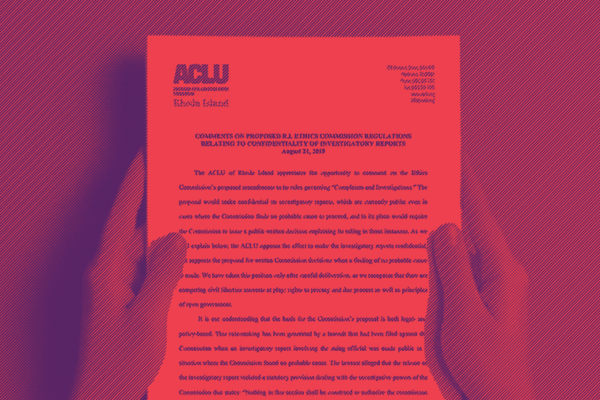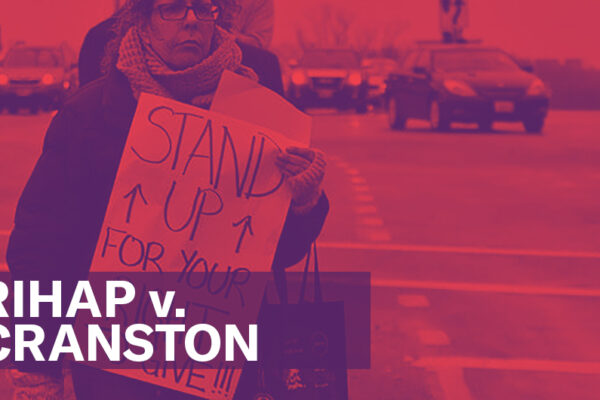The ACLU of Rhode Island today sued the City of Cranston over its latest anti-panhandling ordinance. The suit, filed in federal court by ACLU of RI volunteer attorney Lynette Labinger, argues that the ordinance, enacted earlier this year by a 5-4 vote of the City Council, violates the First Amendment right of individuals to solicit donations and distribute literature on Cranston roadways.
In April 2016, the ACLU favorably settled a lawsuit against Cranston over a similar ordinance that barred the solicitation of donations from motorists. In that settlement, the City acknowledged that the ordinance violated the First Amendment and halted its enforcement. Enacted in February 2017, the current ordinance makes several cosmetic revisions to the original in an attempt – unsuccessfully, the ACLU lawsuit argues – to pass constitutional muster.
“These types of ordinances do two things: they criminalize poverty, and they violate the First Amendment,” said Steven Brown, ACLU of RI executive director. “Both are wrong.”
Francis White, Jr., one of the plaintiffs in the lawsuit, is disabled and formerly homeless. Currently a resident of Providence, White receives food stamps, SSI and housing assistance. Despite this, White often has insufficient income to last to the end of the month and relies upon panhandling for additional support. The lawsuit notes that as a result of the 2017 ordinance, White has refrained from soliciting donations on Cranston roadways for fear of prosecution. In the complaint, he singles out the “kindness and generosity” of Cranston motorists compared to those in other municipalities where he has panhandled.
The other plaintiffs are the Rhode Island Homeless Advocacy Project (RIHAP) and two Cranston residents – Karen Rosenberg and Deborah Flitman – who are members of the Cranston Action Network and would like to engage in leafleting from traffic islands, but are barred from doing so under the ordinance.
RIHAP director Barbara Freitas said today: “This ordinance has absolutely nothing to do with public safety. What this ordinance does is attempt to remove the face of homelessness and people experiencing poverty from the public view. It makes people uncomfortable, but this is reality. There is homelessness and poverty, and some people must rely on panhandling to survive. Let’s not criminalize poverty; let’s come up with some real solutions to solve these problems.”
Although City officials claim the ordinance was adopted as a “public safety” measure, and cited the number of car accidents at various city intersections, the lawsuit notes that the City did not document that any of the accidents were caused by panhandling or leafleting on traffic medians, and even made no attempt to correlate those intersections with places where panhandling routinely occurred.
“The court decisions are clear: soliciting donations on roadways is constitutionally protected First Amendment activity,” said volunteer attorney Labinger. “It is unfortunate that Cranston has seen fit to enact another problematic anti-panhandling ordinance after acknowledging the unconstitutionality of its previous ordinance. The valuable tax dollars being spent to criminalize poverty could be put to much better use alleviating it.”
Laura Jaworski, executive director of House of Hope CDC, an organization working to end homelessness in the state, added: “Anti-panhandling ordinances are cruel because they deny our folks a safe, legal way to meet their basic needs in the face of a broken social safety net. Panhandling keeps an issue of social injustice visible. The ‘out of sight, out of mind’ approach results in a missed opportunity for societal dialogue about inequality and poverty, and provides a distraction from offering solutions that address the root causes of homelessness – namely, income disparity and the lack of affordable housing.”
Plaintiff Karen Rosenberg, who helped with the organizing of a recent leafleting action against the ordinance, said: “A year or two ago, I decided to start carrying a wad of dollar bills in my car. Without judgment, if I am stopped at an intersection where a needy person is asking for help, I give her a dollar. I am troubled by the Cranston ordinance because it interferes with my ability to exercise my conscience as I am moved to do.”
The lawsuit is part of the ACLU’s ongoing effort to challenge and repeal laws that disproportionately affect the rights of the homeless.


